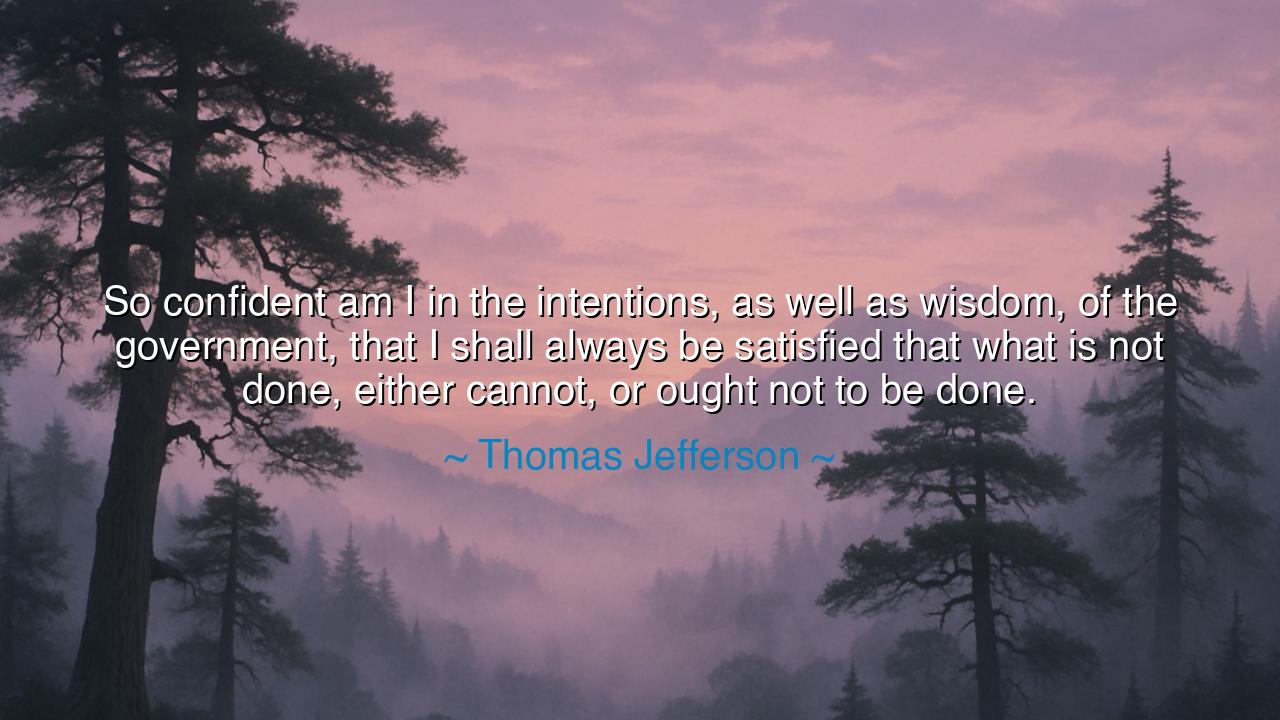
So confident am I in the intentions, as well as wisdom, of the
So confident am I in the intentions, as well as wisdom, of the government, that I shall always be satisfied that what is not done, either cannot, or ought not to be done.






Thomas Jefferson, architect of liberty and sage of the republic, uttered these words with the faith of one who had placed his trust in the wisdom and intentions of a government born from the people. He declares that what the rulers of such a nation do not accomplish must either be impossible in its nature, or unfit in its morality. Thus, he shows a profound confidence that a government grounded in justice and reason will not fail its duty, nor pursue what is wicked. In this, Jefferson reveals both his hope for the new republic and his belief in the harmony between principle and action.
This conviction was forged in the crucible of revolution. Jefferson and his contemporaries had witnessed tyranny under kings, where rulers acted not from wisdom but from pride, not from the people’s good but from their own gain. Against such abuse they raised their voices, and in the Declaration of Independence, Jefferson himself proclaimed that governments derive their just powers from the consent of the governed. His statement, therefore, springs from a deep assurance that a government built on this sacred principle could be trusted to act with virtue.
History offers examples to affirm such faith. Consider the early years of the American republic, when George Washington, though urged by many to grasp more power, declined the crown and stepped down from the presidency after two terms. In this act, the government’s intention was proven pure: it sought not dominion, but service. Jefferson’s trust was not naïve optimism, but a recognition that in a system where rulers are servants of the people, restraint itself can be wisdom.
Yet this teaching carries a warning for all ages. If a government is truly wise and virtuous, then what it refrains from doing is as meaningful as what it does. For not every desire of the people is righteous, and not every demand is possible. The mark of a just government is not endless action, but action guided by justice, and inaction where wrong or excess would lead to ruin. Thus Jefferson calls his listeners to satisfaction in wise restraint, and to patience in matters not yet ripe.
Let the heirs of freedom remember: trust in government must be anchored not in blind loyalty, but in the virtue and wisdom of its foundations. When rulers act with integrity, the people may rest assured that what is withheld was either beyond reach or against righteousness. But if those foundations crumble, then Jefferson’s words stand as both a promise and a challenge—for only when intention and wisdom are one, can the people entrust their fate without fear.






TVvo ngoc thao vy
I’m intrigued by Jefferson’s optimism regarding the government’s intentions and wisdom. It presents an ideal in which governance and citizenry are aligned through mutual trust. However, it raises the question: what mechanisms exist to ensure that governmental wisdom aligns with public good? Could relying solely on trust discourage critical evaluation, or is it more about fostering patience and understanding that good policy takes time to implement?
QAQuynh Anh
This quote makes me reflect on the philosophical tension between faith in authority and personal judgment. Jefferson assumes that unimplemented actions are either impossible or inappropriate, implying a near-perfect governmental decision-making process. I wonder how this approach handles human error or corruption. Does blind confidence risk ignoring inefficiency or injustice, and how can society cultivate informed trust without becoming passive?
TVThanh Van
What strikes me is the implicit belief that government inherently acts with wisdom and moral intention. Jefferson’s perspective suggests that citizens should be satisfied with outcomes as they are. I’d like to explore whether this mindset is compatible with democratic principles today, where public scrutiny and activism play major roles. Can absolute trust coexist with the civic responsibility to question, critique, and demand action?
QQuyen
I find this statement both reassuring and potentially concerning. Jefferson seems to advocate for acceptance of governmental inaction, assuming it is deliberate and justified. But I question whether passively trusting that unimplemented policies are either impossible or unwise might lead to complacency. How do citizens discern when inaction is prudent versus when it reflects neglect or inefficiency? This raises the timeless question of balancing trust with accountability.
R_Rabbit _Gaming
This quote makes me consider the nature of trust in government. Thomas Jefferson expresses a high level of confidence in both the wisdom and intentions of leadership. I wonder, though, is such unwavering trust realistic, especially in modern governance? How can citizens balance faith in governmental judgment with critical oversight? Perhaps Jefferson’s view reflects an idealized vision of leadership that assumes benevolence and competence, which might not always hold true in practice.